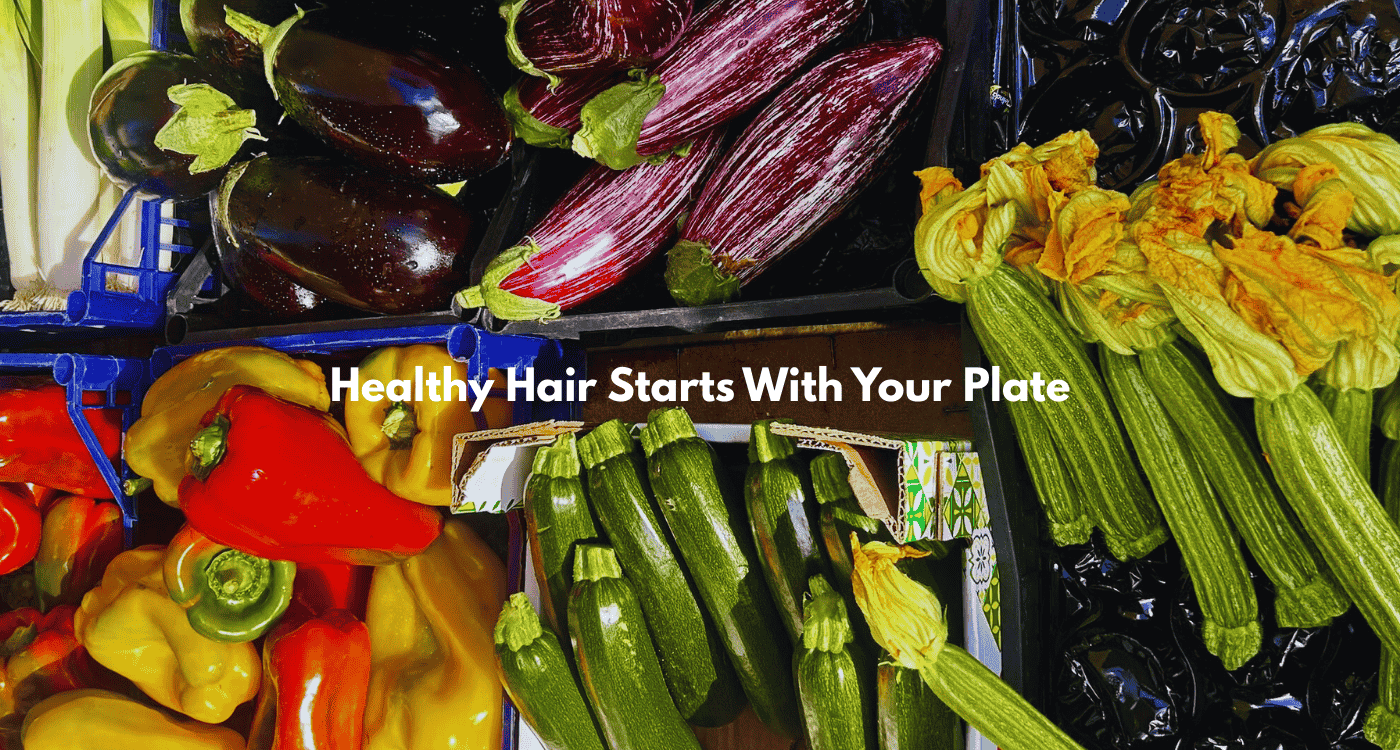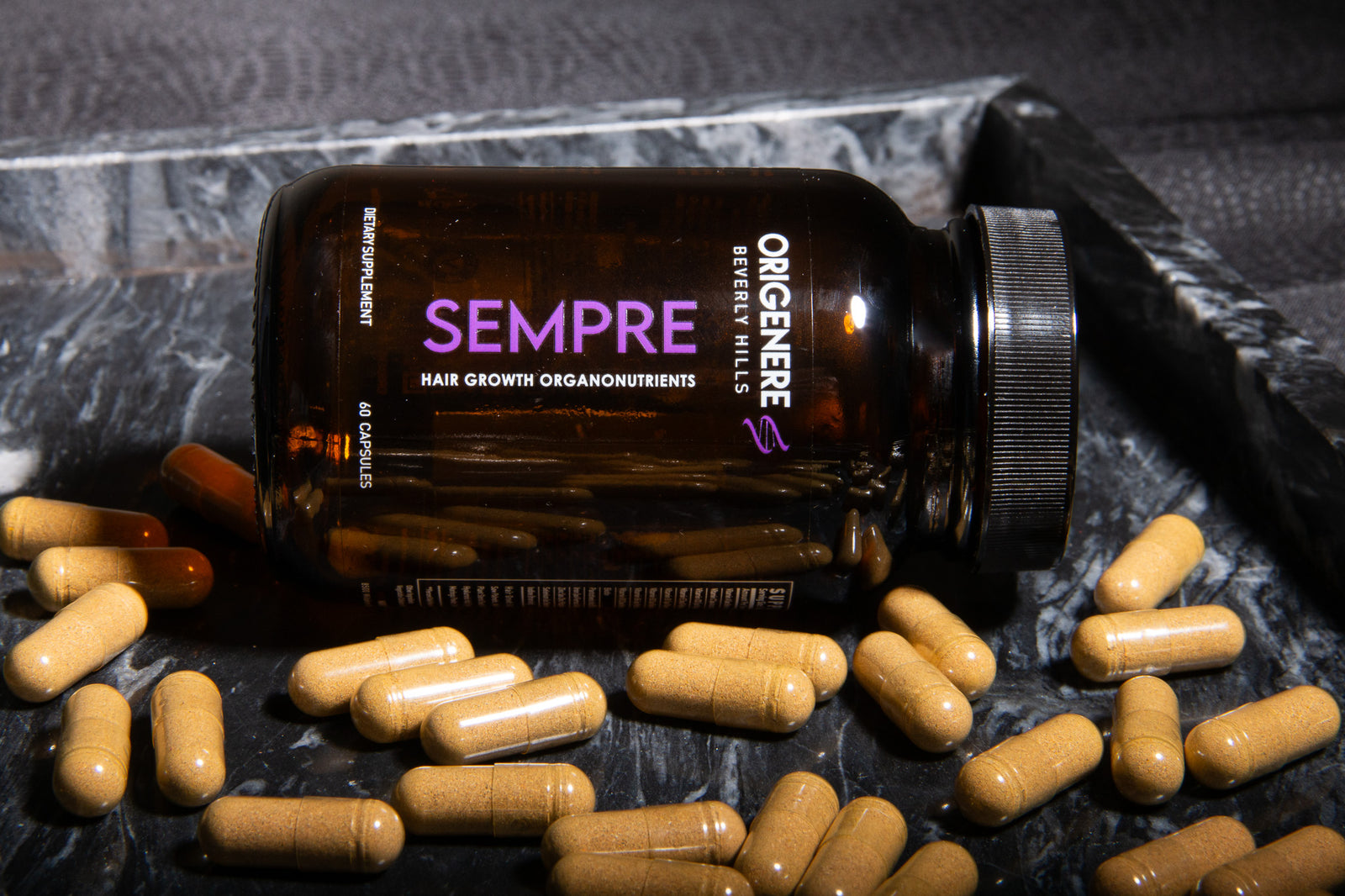Best Fruits and Vegetables for Healthy Hair and Scalp

Key Highlights
-
Strong, shiny hair depends on both genetics and diet, with nutrient-rich fruits and vegetables playing a critical role.
-
Antioxidants like vitamin C and carotenoids protect hair follicles from oxidative stress and UV damage.
-
Nutrients such as iron, folate, and vitamin B complex support red blood cell formation and follicle cell division.
-
Hydrating produce like cucumber and celery helps maintain a moisturized scalp environment.
-
A diet rich in diverse, colorful plant foods ensures a healthy scalp and supports every stage of the hair growth cycle.
Introduction
Strong, healthy hair begins at the follicle, where living cells depend on a constant supply of nutrients. While age and genetics influence the hair cycle, diet remains one of the most powerful tools for supporting long-term hair vitality. Research shows that nutrient deficiencies, particularly in iron, zinc, and folate , are directly linked to thinning, brittle strands, and even telogen effluvium (shedding).
Consuming a colorful range of fruits and vegetables provides antioxidants, vitamins, and minerals that nourish the scalp, strengthen follicles, and stimulate healthy hair growth. From berries rich in vitamin C to cruciferous vegetables packed with sulforaphane, these foods act in synergy to promote scalp health and hair density.
The Science of Hair Growth
Hair is composed primarily of keratin, a structural protein produced in follicles. The growth cycle follows three phases:
-
Anagen (growth phase): Follicles actively divide, building new hair.
-
Catagen (transition phase): Growth slows, and the follicle prepares to rest.
-
Telogen (resting phase): Old hair sheds while new hair forms below.
For this cycle to function properly, the body requires a balanced diet rich in protein, vitamins, and minerals.
-
Iron carries oxygen to follicles through red blood cells; even mild deficiency reduces oxygen supply, weakening growth.
-
Folate (Vitamin B9) supports DNA methylation and cell division, essential for stem cell activation in follicles.
-
Vitamin C enhances collagen production, strengthening the connective tissue around follicles, while also boosting non-heme iron absorption from plant foods.
-
Zinc regulates sebum production and repairs follicle tissues.
Without these important nutrients, the cycle falters leading to hair thinning, shedding, and reduced density.
The Antioxidant Advantage
Hair follicles are especially vulnerable to oxidative damage from free radicals generated by pollution, UV exposure, and stress. Excess oxidative stress disrupts follicle stem cells and accelerates premature graying.
Powerful antioxidants in fruits and vegetables neutralize free radicals:
-
Vitamin C (from citrus, berries, peppers) stimulates collagen synthesis and protects against DNA damage.
-
Vitamin E (from spinach, avocados, almonds) stabilizes cell membranes and improves blood circulation in the scalp.
-
Carotenoids (beta-carotene in carrots, lutein in kale) absorb UV light and defend against photoaging of follicles.
-
Polyphenols (pomegranate, berries) lower inflammation and enhance scalp microcirculation.

This protective shield allows follicles to remain active longer, promoting healthy hair growth.
Essential Fruits for Hair and Scalp Health
Best Fruit for Hair and Skin
-
Avocados: Rich in vitamin E, potassium, and omega-3s. These healthy fats hydrate the scalp and strengthen elasticity. Avocados also contain more potassium than bananas, helping maintain scalp fluid balance.
-
Citrus (oranges, lemons, grapefruits): Excellent source of vitamin C for collagen and improved iron absorption. Flavonoids like naringenin reduce scalp inflammation.
-
Watermelon: 92% water plus lycopene and citrulline. Hydrates follicles, improves blood flow, and protects against environmental stress.
Fruits Good for Hair
-
Berries (strawberries, blueberries, raspberries): Provide vitamin C and anthocyanins that fight free radicals and stimulate collagen. Blueberries top antioxidant charts, shielding follicles from oxidative stress.
-
Pomegranates: Contain ellagitannins and flavonoids that improve scalp blood flow and keratin production.
-
Papaya & Kiwi: Supply vitamin A and vitamin C, supporting follicle cell turnover and collagen production.
Fruits Beneficial for Hair Growth
-
Tropical fruit like mango and papaya are high in vitamin C and beta-carotene, aiding collagen synthesis and protecting follicle DNA.
-
Grapes: Resveratrol reduces inflammation and enhances microcirculation to follicles.
-
Apples: Polyphenols like procyanidin B2 stimulate follicle stem cell activity.
Essential Vegetables for Hair and Scalp Health

Best Vegetables for Healthy Hair
-
Spinach: Rich in iron, folate, and vitamin A. Prevents iron-deficiency thinning and stimulates sebum for a hydrated scalp.
-
Sweet Potatoes: Beta-carotene converts to vitamin A, supporting keratin and sebum production.
-
Carrots: High in vitamin A and falcarinol, which protects follicle cells from oxidative damage.
-
Bell Peppers: Contain more vitamin C than oranges, critical for collagen and iron absorption.
-
Broccoli: A cruciferous vegetable loaded with sulforaphane and vitamin C, protecting follicles and stimulating regeneration.
Hydrating Fruits and Vegetables for a Healthy Scalp
Hydration supports scalp elasticity and prevents dryness that weakens hair shafts. Foods like cucumber, celery, watermelon, and citrus are water-rich and provide electrolytes that optimize fluid balance.

-
Cucumber: Over 95% water, plus silica for connective tissue support around follicles.
-
Celery: Supplies vitamin K and antioxidants, reducing inflammation and promoting microcirculation.
-
Watermelon: Combines hydration with antioxidants, strengthening scalp resilience.
A hydrated scalp ensures nutrients are efficiently delivered to follicles, maintaining shine and density.
Why Variety and Color Matter for Hair and Scalp Health
Eating a wide variety of nutrients from fruits and vegetables is essential because no single food provides everything follicles need. Different colors signal different phytonutrients. For example, cruciferous vegetables like broccoli supply sulforaphane to protect follicles from oxidative damage, while orange carrots and sweet potatoes provide beta-carotene for vitamin A production. Tropical fruit such as papaya and mango adds vitamin C and antioxidants, supporting collagen and scalp circulation. This diversity maximizes the nutritional value of the diet, fueling keratin production, improving blood flow, and keeping a healthy scalp environment where new hair can thrive. Studies consistently show that diets rich in mixed plant colors improve antioxidant defenses and reduce nutrient deficiencies linked to thinning and shedding.
How Fruits and Vegetables Support the Full Hair Cycle
Taken together, fruits and vegetables align with every stage of hair development:
-
Stem Cell Activation: Folate, B vitamins, and sulforaphane enable DNA methylation and follicle cell renewal.
-
Anagen (Growth Phase): Protein, iron, and vitamin C drive keratin synthesis and oxygen delivery.
-
Catagen (Transition): Antioxidants reduce oxidative stress, preventing premature shutdown.
-
Telogen (Resting): Hydration from cucumber and celery balances the scalp, while omega-3s reduce inflammation.
-
Exogen (Shedding & Renewal): Nutrient-rich foods ensure new hair strands grow thicker, shinier, and more resilient.
This nutritional synergy ensures the hair cycle runs smoothly, supporting density, shine, and scalp health.
Other Star Vegetarian Foods for Hair Growth
-
Seeds: Chia seeds and flax provide omega-3s; pumpkin and sunflower seeds deliver zinc for follicle repair.
-
Nuts: Almonds and walnuts are excellent sources of protein, biotin, and vitamin E.
-
Greek Yogurt: Rich in protein and probiotics, supports keratin production and scalp microbiome balance.
-
Legumes: Lentils, chickpeas, and beans provide iron, folate, and plant-based protein.
Supplements as a Complement
While diet is foundational, targeted supplements may help fill nutrient gaps. Formulas containing biotin, zinc, folate, omega-3 fatty acids, and botanicals like saw palmetto can stimulate hair growth, reduce thinning, and support scalp balance. However, supplements should complement and not replace a varied diet. Consulting a healthcare professional ensures safe use tailored to individual health conditions.

Conclusion
The path to healthy hair is rooted in the plate. A balanced diet filled with fruits, vegetables, nuts, and seeds provides the antioxidants, vitamins, and minerals needed to fuel follicles, stimulate keratin production, and maintain scalp hydration. When these foods are consumed in synergy, they protect against oxidative stress, support red blood cell function, and keep the hair cycle flowing. Over time, this nutritional foundation translates into stronger, shinier, and denser hair.
Guo, E. L., & Katta, R. (2017). Diet and hair loss: effects of nutrient deficiency and supplement use. Dermatology Practical & Conceptual, 7(1), 1–10. https://doi.org/10.5826/dpc.0701a01
Yadav, M. S., Kushwaha, N., & Maurya, N. K. (2025). The influence of diet, lifestyle, and environmental factors on premature hair greying: An evidence-based approach. Archives of Clinical and Experimental Pathology, 4(1). https://clinicsearchonline.org/uploads/articles/1741403604ACEP-25-RW-40-Galley_Proof.pd
Mayer, W., Weiel, M., De Luca, C., Ibragimova, G., Trakhtman, I., Kharaeva, Z., Chandler, D. L., & Korkina, L. (2023). Biomolecules of fermented tropical fruits and fermenting microbes as regulators of human hair loss, hair quality, and scalp microbiota. Biomolecules, 13(4), 699. https://www.mdpi.com/2218-273X/13/4/699
Bassino, E., Gasparri, F., & Munaron, L. (2020). Protective role of nutritional plants containing flavonoids in hair follicle disruption: A review. International Journal of Molecular Sciences, 21(2), 523. https://doi.org/10.3390/ijms21020523






What wonderful information!! Enjoyed all the articles!!
Leave a comment